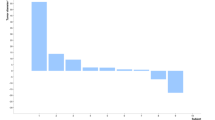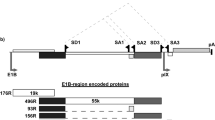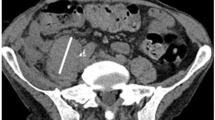Abstract
We describe a study showing that the adenovirus adl118, lacking both E1B proteins, very efficiently kills human malignant cells ‘in vitro’ and ‘in vivo’. Since many breast cancer patients do not have metastasis at the time of diagnosis, but finally develop it, we planned to study whether intravascular injections of adl118 could prevent metastatic development. We studied the effects of this mutant adenovirus in an orthotopic model of human breast carcinoma xenografts with the breast MB435-lung 2 cell line, which is highly metastatic in the lungs. In this study, all primary tumors were excised when they reached 50–100 mm3 volume in the animals. After surgery, 1010 p.f.u. of adl118 was intravenously injected into a random group of animals, either three times during the first week only, or once every week. At death, almost all the control animals showed numerous lung metastases of large size, which were present in only 15–40% of the treated animals, depending on the size of the primary tumor at the time of excision. Overall survival was 50–70 days in control mice, and over 120 days in mice injected with adl118. Concomitant treatment with adl118 and cisplatin did not enhance the antitumor effects of adl118. With these results, we conclude that intravenous injection of conditional replicative adenovirus, after excision of the primary tumor, induces a clear decrease in the metastatic disease, and could be a new strategy in preventing tumor metastasis of breast carcinomas.
This is a preview of subscription content, access via your institution
Access options
Subscribe to this journal
Receive 12 print issues and online access
$259.00 per year
only $21.58 per issue
Buy this article
- Purchase on Springer Link
- Instant access to full article PDF
Prices may be subject to local taxes which are calculated during checkout








Similar content being viewed by others
References
Hellman S . Natural history of small breast cancers J Clin Oncol 1994 12: 2229–2234
Alberg AJ, Singh S, May JW, Helzlsouer KJ . Epidemiology, prevention, and early detection of breast cancer Curr Opin Oncol 2000 6: 515–520
Fisher B . Prognosis and treatment of patients with breast tumors of one centimeter or less and negative axillary lymph nodes J Natl Cancer Inst 2001 2: 112–120
Fisher B . Tamoxifen and chemotherapy for lymph node-negative breast cancer J Natl Cancer Inst 1997 89: 491–496
Alemany R, Balague C, Curiel D . Replicative adenoviruses for cancer therapy Nat Biotechnol 2000 7: 723–727
Fueyo J . A mutant oncolytic adenovirus targeting the Rb pathway produces anti-glioma effect in vivo. Oncogene 2000 19: 2–12
Heise C, Kim DH . Replication-selective adenoviruses as oncolytic agents J Clin Invest 2000 7: 847–851
Khuri FR . A controlled trial of intratumoral ONYX-015, a selectively replicating adenovirus, in combination with cisplatin and 5-fluorouracil in patients with recurrent head and neck cancer Nat Med 2000 8: 879–885
Martin-Duque P . Adenovirus lacking 19-kDa and 55-kDa E1B genes exerts a marked cytotoxic effect in human malignant cells Cancer Gene Ther 1999 6: 554–563
Bischoff JR . An adenovirus mutant that replicates selectively in p53 deficient human tumor cells Science 1996 274: 373–376
Heise C . An adenovirus E1A mutant that demonstrates potent and selective systemic anti-tumoral efficacy Nat Med 2000 10: 1134–1139
Paulovich AG, Toczyski DP, Hartwell LH . When checkpoints fail Cell 1997 88: 315–321
Levine AJ . p53, the cellular gatekeeper for growth and division Cell 1997 88: 323–331
Hunter T . Oncoprotein networks Cell 1997 88: 333–346
Frisch SM . Antioncogenic effect of adenovirus E1A in human tumor cells Proc Natl Acad Sci USA 1991 88: 9077–9081
Mumryk JS . Tumor suppressive properties of the adenovirus 5 E1A oncogene Oncogene 1996 13: 1581–1589
Sánchez-Prieto R . Carcinoma cell lines become sensitive to DNA-damaging agents by the expression of the adenovirus E1a gene Oncogene 1996 13: 1083–1092
Sánchez-Prieto R . In vivo antitumor effect of retrovirus-mediated transfer of the adenovirus E1a gene Cancer Gene Ther 1998 4: 215–224
Yujiao Chang J . The tumor suppression activity of E1A in HER-2/neu-overexpressing breast cancer Oncogene 1997 14: 561–568
Silva JM . Presence of tumor DNA in plasma of breast cancer patients: clinicopathological correlations Cancer Res 1999 13: 3251–3256
Chen X . Detecting tumor-related alterations in plasma or serum DNA of patients diagnosed with breast cancer Clin Cancer Res 1999 9: 2297–2303
Olivotto Y . Adjuvant systemic therapy and survival after breast cancer N Engl J Med 1994 30: 805–810
Sauthoff H, Heitner S, Rom WN, Hay JG . Deletion of the adenoviral E1b-19kD gene enhances tumor cell killing of a replicating adenoviral vector Hum Gene Ther 2000 11: 379–388
Ghaneh P . Adenovirus-mediated transfer of p53 and p16INK4a results in pancreatic cancer regression in vitro and in vivo Gene Therapy 2001 8: 199–208
Eastham JA, Grafton W, Martin CM, Williams BJ . Suppression of primary tumor growth and the progression to metastasis with p53 adenovirus in human prostate cancer J Urol 2000 3: 814–819
Clayman GL . Adenovirus-mediated p53 gene transfer in patients with advanced recurrent head and neck squamous cell carcinoma J Clin Oncol 1998 16: 2221–2232
Clayman GL . Adenovirus-mediated p53 gene transfer in patients with advanced recurrent head and neck squamous cell carcinoma
Roelvink PW . Identification of a conserved receptor-binding site on the fiber proteins of CAR-recognizing adenoviridae Science 1999 286: 1568–1571
Yang Y, Trinchieri G, Wilson JM . Recombinant IL-12 prevents formation of blocking IgA antibodies to recombinant adenovirus and allows repeated gene therapy to mouse lung Nat Med 1995 1: 890–893
Babiss LE, Fisher PB, Ginsberg HS . Effect on transformation of mutations in the early region 1b-encoded 21 and 55-kilodalton proteins of adenovirus 5 J Virol 1984 52: 389–395
Horwitz MS . Adenoviruses Fields BN, Knipe DN, Howley PM (eds); Fields Virology Lippincott-Raven 1996 2149–2171
Zhang RD, Fidler IJ, Price JE . Relative malignant potential of human breast carcinoma cell lines established from pleural effusions and a brain metastasis Invas Metast 1991 4: 204–215
Price JE . Breast cancer cell line isolated from metastases in different organs of nude mice Int J Oncol 1994 5: 459–467
Acknowledgements
We thank Dr R Alemany for providing the adGFP and for his critical reading of the manuscript. We thank S Jones for preparing the manuscript, Isabel Millan for the statistical anaylsis and Javier Hernandez for the in vivo studies. This work was supported by grants from the ‘Fondo Español de Investigaciones Sanitarias’, FIS 99/0504, and FIS 00/ 903 (AF); the Comunidad de Madrid, CAM 98/08.1/2, Aventis; and the Areces Foundation.
Author information
Authors and Affiliations
Rights and permissions
About this article
Cite this article
Fabra, A., Parada, C., Vinyals, A. et al. Intravascular injections of a conditional replicative adenovirus (adl118) prevent metastatic disease in human breast carcinoma xenografts. Gene Ther 8, 1627–1634 (2001). https://doi.org/10.1038/sj.gt.3301567
Received:
Accepted:
Published:
Issue Date:
DOI: https://doi.org/10.1038/sj.gt.3301567
Keywords
This article is cited by
-
Oncolytic adenovirus-mediated transfer of the antisense chk2 selectively inhibits tumor growth in vitro and in vivo
Cancer Gene Therapy (2006)
-
Armed therapeutic viruses: Strategies and challenges to arming oncolytic viruses with therapeutic genes
Cancer Gene Therapy (2002)



